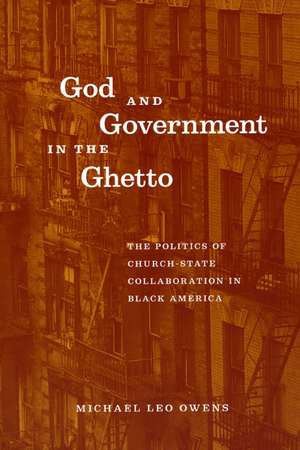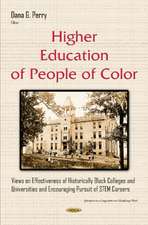God and Government in the Ghetto: The Politics of Church-State Collaboration in Black America: Morality and Society Series
Autor Michael Leo Owensen Limba Engleză Paperback – 20 dec 2007
In recent years, as government agencies have encouraged faith-based organizations to help ensure social welfare, many black churches have received grants to provide services to their neighborhoods’ poorest residents. This collaboration, activist churches explain, is a way of enacting their faith and helping their neighborhoods.
But as Michael Leo Owens demonstrates in God and Government in the Ghetto, this alliance also serves as a means for black clergy to reaffirm their political leadership and reposition moral authority in black civil society. Drawing on both survey data and fieldwork in New York City, Owens reveals that African American churches can use these newly forged connections with public agencies to influence policy and government responsiveness in a way that reaches beyond traditional electoral or protest politics. The churches and neighborhoods, Owens argues, can see a real benefit from that influence—but it may come at the expense of less involvement at the grassroots.
Anyone with a stake in the changing strategies employed by churches as they fight for social justice will find God and Government in the Ghetto compelling reading.
But as Michael Leo Owens demonstrates in God and Government in the Ghetto, this alliance also serves as a means for black clergy to reaffirm their political leadership and reposition moral authority in black civil society. Drawing on both survey data and fieldwork in New York City, Owens reveals that African American churches can use these newly forged connections with public agencies to influence policy and government responsiveness in a way that reaches beyond traditional electoral or protest politics. The churches and neighborhoods, Owens argues, can see a real benefit from that influence—but it may come at the expense of less involvement at the grassroots.
Anyone with a stake in the changing strategies employed by churches as they fight for social justice will find God and Government in the Ghetto compelling reading.
Din seria Morality and Society Series
-
 Preț: 185.66 lei
Preț: 185.66 lei -
 Preț: 185.22 lei
Preț: 185.22 lei -
 Preț: 292.67 lei
Preț: 292.67 lei -
 Preț: 232.14 lei
Preț: 232.14 lei - 5%
 Preț: 228.75 lei
Preț: 228.75 lei -
 Preț: 272.69 lei
Preț: 272.69 lei -
 Preț: 232.52 lei
Preț: 232.52 lei -
 Preț: 319.45 lei
Preț: 319.45 lei -
 Preț: 249.40 lei
Preț: 249.40 lei -
 Preț: 324.83 lei
Preț: 324.83 lei -
 Preț: 271.85 lei
Preț: 271.85 lei -
 Preț: 299.59 lei
Preț: 299.59 lei -
 Preț: 253.13 lei
Preț: 253.13 lei -
 Preț: 257.00 lei
Preț: 257.00 lei -
 Preț: 319.45 lei
Preț: 319.45 lei -
 Preț: 291.90 lei
Preț: 291.90 lei -
 Preț: 221.03 lei
Preț: 221.03 lei -
 Preț: 245.75 lei
Preț: 245.75 lei -
 Preț: 268.41 lei
Preț: 268.41 lei -
 Preț: 272.64 lei
Preț: 272.64 lei -
 Preț: 317.33 lei
Preț: 317.33 lei -
 Preț: 278.60 lei
Preț: 278.60 lei - 16%
 Preț: 211.52 lei
Preț: 211.52 lei - 14%
 Preț: 198.63 lei
Preț: 198.63 lei - 13%
 Preț: 199.38 lei
Preț: 199.38 lei - 22%
 Preț: 481.18 lei
Preț: 481.18 lei - 17%
 Preț: 153.17 lei
Preț: 153.17 lei
Preț: 276.94 lei
Nou
Puncte Express: 415
Preț estimativ în valută:
53.02€ • 54.55$ • 44.69£
53.02€ • 54.55$ • 44.69£
Carte tipărită la comandă
Livrare economică 01-15 martie
Preluare comenzi: 021 569.72.76
Specificații
ISBN-13: 9780226642079
ISBN-10: 0226642070
Pagini: 304
Ilustrații: 2 halftones, 6 line drawings, 5 tables
Dimensiuni: 152 x 229 x 18 mm
Greutate: 0.44 kg
Editura: University of Chicago Press
Colecția University of Chicago Press
Seria Morality and Society Series
ISBN-10: 0226642070
Pagini: 304
Ilustrații: 2 halftones, 6 line drawings, 5 tables
Dimensiuni: 152 x 229 x 18 mm
Greutate: 0.44 kg
Editura: University of Chicago Press
Colecția University of Chicago Press
Seria Morality and Society Series
Notă biografică
Michael Leo Owens is assistant professor of political science at Emory University.
Cuprins
Acknowledgments
Introduction
Part One: Scope and Theory of Church-State Collaboration
1 The Extent and Support of African American Churches' Collaboration with Government
2 The Volition to Collaborate with Government
Part Two: The Social and Political Context of New York City
3 Public Policy and Black Neighborhood Decline
4 Faith in Action for Neighborhood Redemption
Part Three: Inside Church-State Collaboration
5 Partnering with Caesar
6 Acquiring Resources for Neighborhood Resurrection
7 Complementing Collaboration
Conclusion
Research Note
Notes
References
Index
Introduction
Part One: Scope and Theory of Church-State Collaboration
1 The Extent and Support of African American Churches' Collaboration with Government
2 The Volition to Collaborate with Government
Part Two: The Social and Political Context of New York City
3 Public Policy and Black Neighborhood Decline
4 Faith in Action for Neighborhood Redemption
Part Three: Inside Church-State Collaboration
5 Partnering with Caesar
6 Acquiring Resources for Neighborhood Resurrection
7 Complementing Collaboration
Conclusion
Research Note
Notes
References
Index
Recenzii
“This exceptional book will be crucial for those of us who study black politics. In this era of strange alliances between the Republican right and black Christian fundamentalists, research that illuminates how the formerly contentious and confrontational black church has adapted to certain political realities has cutting-edge relevancy.”
“God and Government in the Ghetto is a must read for anyone who wants to understand the political significance of contemporary African-American churches. Without a hint of sentimentality or nostalgia for an idealized ‘black church,’ Owens lays bare the contributions, challenges, and contradictions inherent in collaborative efforts among black churches and state structures. It is a refreshing analysis and a timely contribution in a critical moment.”
“Owens provides a theoretically rich study that considers how activist black churches collaborate with local governments, demonstrating how collaboration can create a ‘third wave’ of church-based activism in black communities today. God and Government in the Ghetto documents this alternative form of activism like no other study has done before. It is an important scholarly work that will inform policymakers and practitioners alike.”
"A useful account of the operation of FBOs 'in the trenches' in the nation's largest city. Owens strikes a balance between providing details of local situations with a theoretically (and politically) sophisticated account of the motives of various participants. The book is an excellent read and deserves the attention of scholars interested in the problems of urban poverty, and those whose primary focus is the relationship between religion and politics."
"Students of religion and public policy will learn much from this book. . . . With this research, we can now better understand the process of church-state collaboration."
"Using an effective mixture of surveys, interviews, and observation, Owens delineates the benefits and challenges for religious organizations in collaborating with government bodies and agencies to develop housing. . . . Owens develops sound theoretical arguments, moving beyond past definitions of patronage, co-optation, and church-government relationships in general to provide a carefully nuanced set of terms and definitions with pragmatic and philosophical value for the future of faith-based initiatives."










